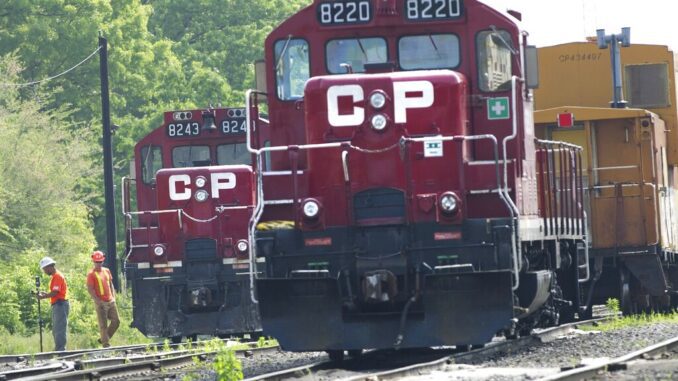
Approximately 3,000 Canadian Pacific Railway conductors, engineers, train and yard workers represented by the Teamsters Canada Rail Conference returned to work Tuesday after an agreement was reached between the railroad operator and union after a work stoppage brought trains to a halt across Canada and interrupted fertilizer and other shipments to and from the U.S.
Canadian Teamsters and CP Rail had blamed each other in a standoff that U.S. senators urged the Biden administration to prevent by engaging the Canadian stakeholders. The senators, including Senator Thom Tillis (R-NC), raised concerns over rising fertilizer and fuel prices during the spring planting season and lobbied for the elimination of the cross-border vaccine mandate for transporters of essential commerce.
Canadian Pacific covers much of the U.S. Midwest and is a large shipper of potash and fertilizer for agriculture. It also carries grain from the U.S. to its northern neighbor for domestic use and exports. The railroad serves the Dakotas, Minnesota, Iowa, Illinois, Wisconsin, Missouri and other states, according to a map on its investor website. CP also operates in New England and upstate New York, spokesman Patrick Waldron said.
CP says it’s the leading carrier of potash, a plant nutrient used in the production of multiple crops. The company says in investor documents that it carries 70% of the potash produced in North America, all from mines in Saskatchewan.
The railroad says it also carries fertilizers, including phosphate, urea, ammonium sulfate, ammonium nitrate and anhydrous ammonia. About half its fertilizer shipments originate from processing plants in Alberta.
CP got 29% of its 2020 freight revenue from cross-border shipments between the U.S. and Canada, its investor website said.
A lengthy interruption of fertilizer shipments could hurt U.S. farmers, who are nearing the spring planting season. The work stoppage could also exacerbate existing supply chain bottlenecks in the U.S. and Canada that stem from the COVID-19 pandemic.
U.S. trains were not affected by the work stoppage, but the railroad cannot make shipments between the two nations, Waldron said.
On Saturday, the Teamsters said in a statement that the company had locked the workers out, but later issued another statement saying the workers were also on strike.
The original statement posted to the Teamsters Canada Rail Conference website late Saturday said the union wanted to continue bargaining but the company “chose to put the Canadian supply chain and tens of thousands of jobs at risk.”
“As Canadians grapple with a never-ending pandemic, exploding commodity prices and the war in Ukraine, the rail carrier is adding an unnecessary layer of insecurity, especially for those who depend on the rail network,” the statement said.
CP Rail, Canada’s second-largest railroad operator, said it was the company that wanted to keep talking, and the union that pulled its employees off the job.
CP President Keith Creel said in a news release the union “failed to respond” to a new offer presented by mediators before the midnight deadline.
“Instead, the TCRC opted to withdraw their services before the deadline for a strike or lockout could legally take place,” he said. “The TCRC is well aware of the damage this reckless action will cause to the Canadian supply chain.”
Labor Minister Seamus O’Regan urged the two sides to keep bargaining.
The Canadian and U.S. supply chains also were hit by trucker convoy protests blocking border crossings in February, and now are dealing with the effects, particularly on global fuel supplies, of the Russian invasion in Ukraine and sanctions imposed by the U.S. and its allies.
All the disruptions pushed inflation to its highest level since the early 1980s, with essentials such as food and fuel facing some of the sharpest price hikes.
Earlier this month, U.S. Senator Thom Tillis (R-NC) and 18 of his Senate colleagues wrote a letter to President Joe Biden regarding record increases in fertilizer prices approaching the spring planting season.
The group referenced the ongoing supply-chain bottlenecks and the rising cost of energy, among other factors that have sent fertilizer and fuel prices soaring, including Russia’s invasion of Ukraine. The senators are urged the Biden administration to immediately take all necessary steps to curtail the rising costs impacting American farmers and consumers.
“We are writing to express our serious concern regarding record-high fertilizer prices impacting American farmers going into the spring planting season. Fertilizer is a primary input and major expense for producers across the country, and price increases will have a significant effect on farm profitability and the prices of food and consumer products,” the senators wrote.
The letter pointed to Russia’s role as a key producer of fertilizer and necessary inputs of fertilizer, its invasion of Ukraine and sanctions imposed on the country as the likely causes of shortages and price increases of fertilizer. These potential disruptions, coupled with skyrocketing energy prices, characterized by the senators as “President Biden’s war on the American oil and gas industry,” will “harm American farmers and in turn, American consumers,” the senators argued.
“We are therefore urging your administration to review all available options to lower the cost of fertilizer, including but not limited to: eliminating the cross-border vaccine mandate for transporters of essential commerce; engaging stakeholders to prevent a Canadian Pacific Railway strike; ensuring agricultural minerals like phosphate and potash are part of the Department of the Interior’s List of Critical Minerals; increasing U.S. gas production; and approving pending export permits at the Department of Energy for Liquefied Natural Gas,” the senators concluded.
NSJ staff contributed to this report.



